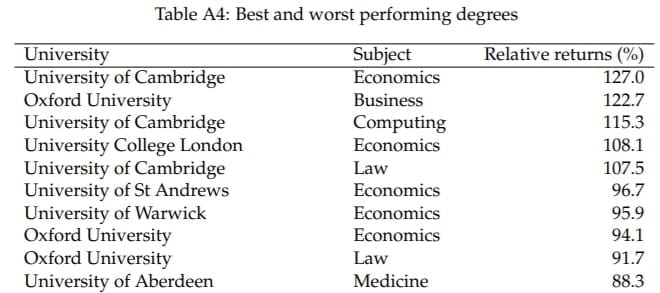Economics at Cambridge comes top

Oxbridge law degrees deliver a salary boost greater than almost any other degree in any subject in the entire country, researchers say.
The top ten degrees ranked by how much extra recipients earn compared with the average grad includes Cambridge law at number five and Oxford law at number nine.
The finding comes in a paper published by experts at the Institute for Fiscal Studies (IFS), the UK’s top think-tank for all things money-related.
As Legal Cheek has previously reported, the government has pretty detailed info on how much people earn on average after getting a given degree at a given uni. The league table for law, for example, shows Oxford grads way out in front at £72,600 five years on, followed by Cambridge (£59,900), UCL and Bristol (both £50,000).
This research uses the same data, but crunches the numbers to come up with slightly more sophisticated findings than our earnings league table.
For example, the boffins have been able to calculate the extra earnings power of, say, law at Oxford compared with doing an OK degree at a decent uni. The degree selected as bang average for the purposes of this comparison is history at Sheffield Hallam.
Top of this league table is economics at Cambridge, with a 127% earnings premium compared to history at Hallam. Law at Cambridge comes in fifth at 108% — so more than double the average — while law at Oxford comes in ninth at 92% higher. That’s out of almost 2,000 subject-uni combinations.

The worst performing degree is philosophy at SOAS, which lands graduates an average salary 53% lower than the baseline.
This ranking also controls for things like how well people did in school and where they grew up. In other words, the fact that smart posh people have a better chance of getting into Cambridge law in the first place is taken into account in trying to assess the boost to earnings generated by the degree itself.
In general, the most selective a law course is, the greater the earnings boost. How hard the degree is to get into explains most of the difference in earnings potential between the different law schools.
But people pick their course on lots of other factors: league tables and student satisfaction, for example. If you chose your law degree based on those, what difference would it make to your earning potential?
Sod all, the IFS says. All that really matters is how selective the course is; the rest is just noise. Intriguingly, even getting a first doesn’t move the dial much.
Or as the paper puts it: “Other measures of degree quality including publicly available subject-specific university rankings, completion rates and degree performance are all correlated with returns, but this almost completely disappears once we control for selectivity.”
Given this finding, the researchers reckon that “students are making choices that can have enormous implications for their future outcomes with poor information on which to base those choices”. So if what you care about in a law degree is earnings potential, ditch the uni rankings and set your sights on the course that demands the highest grades for entry.


